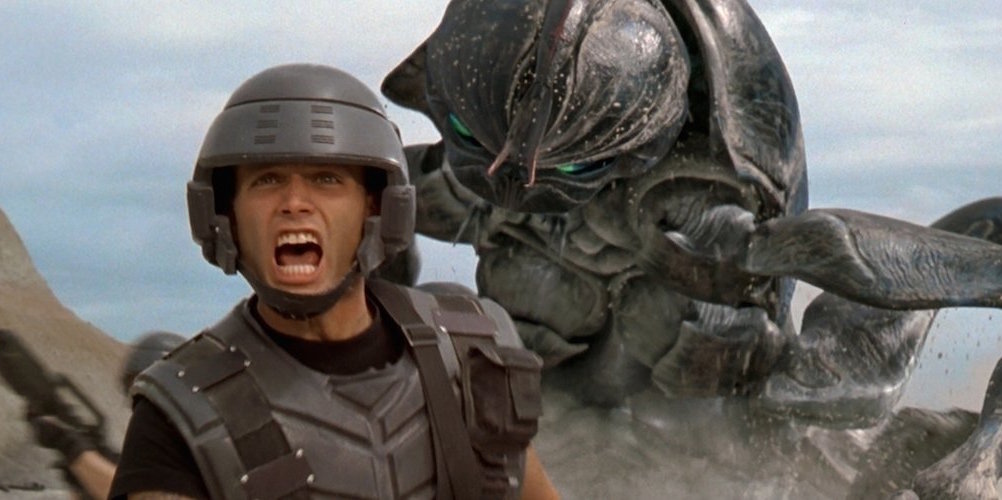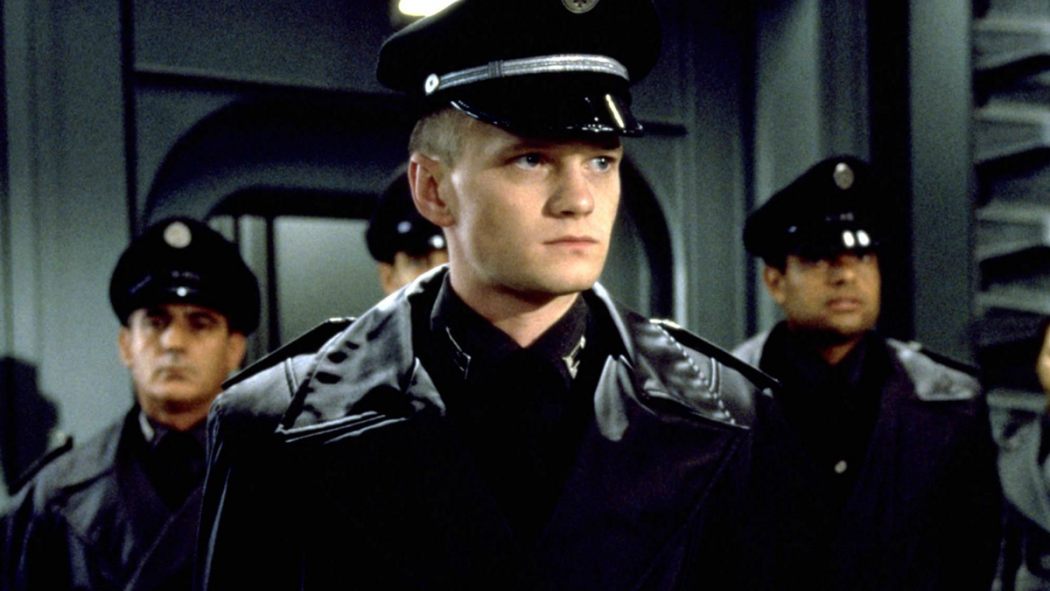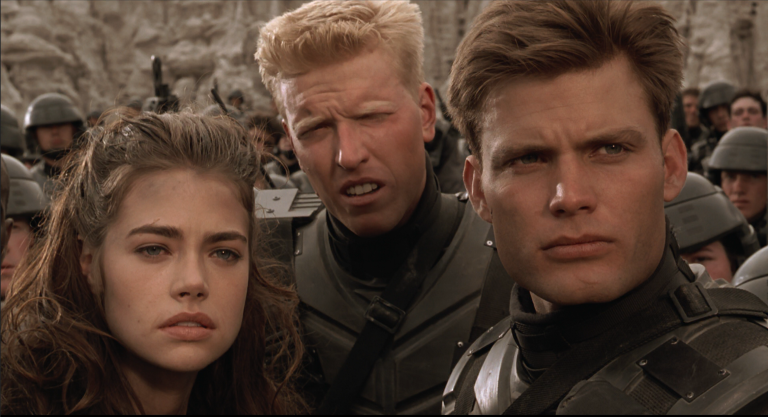Is Starship Troopers, a fascist satire, coming true?

STILL FROM STARSHIP TROOPERS, COURTESY OF TRISTAR PICTURES
“The only good bug is a dead bug!”
This line from Starship Troopers—uttered by an unnamed extra, strolling through the burning rubble of Buenos Aires in a military propaganda video—captures the gonzo spirit of director Paul Verhoeven’s military satire, which turned 20 this week. An adaptation of Robert Heinlein’s 1959 novel of the same name, the movie depicts humanity locked in a desperate struggle with a race of insectoid aliens. It traces the journey of four high school students—played by Caspar Van Dien, Denise Richards, Dina Meyer, and Neil Patrick Harris—who sign up to fight only to brave the horrors of war and dodge buckets of bug slime.
Verhoeven’s most recent movie Elle [2016] explored the farthest extremes of taste. RoboCop [1987], Total Recall [1990], Basic Instinct [1992], Showgirls [1995], and Starship Troopers [1997] overflow with garish sex and violence, absurd plot lines, and vein-popping acting. But Verhoeven wasn’t just interested in pushing buttons. He used genre movies as vehicles for social commentary, injecting subversive currents beneath their lurid skin.
When Starship Troopers was released, critics panned it as a simplistic B-movie. Former film critic Janet Maslin called it “raunchiness tailor-made for teen-age boys” in the New York Times. It’s not a totally unfair description of a movie in which most scenes involve characters being sprayed with lime-green alien guts. But over the last two decades, the movie has become a cult classic, as audiences picked up on Verhoeven’s acidic satire of the media-military-industrial complex. The director (alongside scriptwriter Ed Neumeier, who he also worked with on RoboCop, itself a military satire) took inspiration from The Triumph of the Will filmmaker Leni Riefenstahl, using shots lifted from her work and casting actors who resembled square-jawed, Aryan archetypes. Characters fight heroically in battle, and then the camera pulls back to show that footage being used in recruitment ads. It’s hard not to draw a parallel with America’s 17-years-and-counting of engagement in the Middle East. What comes after the war? More war.
This is a surprisingly radical message for a big budget ($100 million) studio film. “I don’t think that will be done again, a movie like that,” Verhoeven admits over the phone. “It’s so surprising that this was made. I don’t think anyone nowadays would dare to make a movie like that.”
Perhaps the movie’s most prophetic element is the way it shows how unreality infects every aspect of life in an authoritarian society. When it was released, critics misinterpreted the soapy dialogue and hysterical acting as directorial over-reach. In fact, Verhoeven was exploring the sense of mania and dislocation that sets in under a constant regime of propaganda. “Dreamlike fascism is a dream that fascism proposes to you,” the director explains. “In reality, that dream is a nightmare.”
Verhoeven understands this dynamic all too well; in 1943, when he was five, his family moved to the Hague, then the base for Nazi operations in The Netherlands during World War II. When the war ended, Verhoeven believed he’d never again experience life under totalitarianism. Now, he thinks it’s beginning to reappear in America. He intended Starship Troopers to be fantasy with a subversive edge. Twenty years on, it just seems like a depressing and accurate portrayal of a world where normal things have been replaced by absurd caricatures, like the one currently occupying the White House. Verhoeven’s campy vision captured the way fascism turns reality into reality TV.
EZRA MARCUS: Over the last 20 years, what are some of the parallels you’ve seen between Starship Troopers and reality? It seems that it’s become very accurate with what the world is like now a days.
PAUL VERHOEVEN: So parallels between Starship Troopers and what happening in the United States, I suppose?
MARCUS: Yes, exactly.
VERHOEVEN: Well, there’s a sentence in the beginning of the movie, spoken out by [Lieutenant Jean] Rasczak, and he says, “After the failure of democracy,” and he starts to talk about the new regime. I would say in a general way, there is the fear at the moment and some clarity—at least, there are indications in the direction—that democracy in the United States is very much distressed. There is a feeling that the Republican Party is moving in a direction you would say is anti-democratic. If you want to be more sharp, you could even say a fascist direction. So I would say that line, about the failure of democracy, some say that is happening to a certain degree. It might not be happening, of course. But that is the most important parallel for me.
And the results of that kind of politics, as laid out by Rasczak in the beginning of the movie, that is preparing you for what I have called often in interviews “a fascist utopia.” Where the heroes—men and women, boys and girls—are not aware that they’re living in a kind of utopia, and they don’t realize it has a fascist core. When we were writing the script and making the movie, it was not that we—[Edward] Neumeier and I—were really thinking that this would happen. It was a hyperbolic adventure, basically. There were indications that something like that could probably happen to the United States. But certainly not visible, or very clearly.
And of course, Buenos Aires is a stand in for New York or Los Angeles. That is the second layer of the movie; these people don’t realize what kind of society they have entered, or what’s really the meaning of that. Until the end of the movie they think this is normal, and I think that basically is what’s happening now.
MARCUS: I feel like nobody else was really thinking about this kind of thing 20 years ago.
VERHOEVEN: No, of course not. And as I tried to point out, it’s not that we thought that this would happen. It was an extrapolation from certain signs that these elements, these dreamlike forces, would lead to reality. I thought it was more us fantasizing about possibilities in the United States, without ourselves believing it. In fact, we were often laughing when we were writing the script because we thought it was funny, you know? [laughs] But now it’s not funny at all.
And because we are witnessing something that is basically coming close to what we predicted—not that we knew, we are not prophets. We were making some statements underneath the movie. The peripheral layer is interwoven with the main narrative. It’s very much visible in the newsreels, which are all based on German fascism. I felt that this was talking about upcoming fascism, of course. Even the Germans, I would say 80 to 90 percent of the Germans, when all this happened, didn’t think that it was happening. You see all the newsreels from the streets of Berlin—they’re all of very happy looking guys or girls. They were not aware of the threats, the diabolical deaths underlining the politics of the government. At that point I did not feel, in all honesty, that this was really something of a possibility in the United States. Otherwise we would’ve been prophets. [laughs]
MARCUS: I love the way that the movie turns the actions of its heroes into media fodder to further justify military action through those newsreels. What drew you to those ideas?
VERHOEVEN: I think a lot of these things were explorations of what was visible. I mean one of the things in the commercial, for example, is all these kids who wanted to have guns and bullets—that was really a sarcastic comment on this problem in the United States. This abundance of weapons and desire to have weapons and the love for weapons. Every time there is another gun disaster in the United States, people talk about gun laws and all that stuff, and then it goes on for a couple of weeks and then nothing happens. So we picked that up and translated that in a kind of funny, clearly hyperbolic scene, where these kids are so happy with guns even though they’re 10 years old.
Most of these news items were based on things we saw that were around us. That’s how we made them. It was also because Ed and I came together after RoboCop, and we had done similar newsreels and television news there, and that was something that came to our minds easily because we’ve done it before.

MARCUS: You mentioned this phrase “dreamlike fascism.” Can you tell me a bit more about that?
VERHOEVEN: So dreamlike fascism is a fascism that presents itself as a utopia, like it did in Germany. In the movie, it seems to be that all these people really feel that slogan, “Kill them all.” It’s a dream, you know? What fascism proposes is a dream and what fascism gives you, is a nightmare.
MARCUS: All the performances in the film are so cartoonish and so over the top, which seems to me to add to the dreamlike state.
VERHOEVEN: We were paraphrasing elements of Riefenstahl movies. Everybody seemed to be sculptures—I wanted these people to be like proto-Nazis, proto-Aryans. Their faces are kind of sculptures. So I thought to choose actors who would have streamlined faces, and certainly Johnny Rico has that. I think that was a necessity to make it believable to myself, the exaggeration. There’s no question, the bugs are fantasy and comic book-y! So if you use those kinds of elements, then you should be careful not to make your caricature around them completely real because they clash! If you have a caricature enemy you can’t have a very realistic protagonist. I think it was necessary to make them two comic book figures, that was the idea.
MARCUS: How do the media newsreels work in the film?
VERHOEVEN: The media is pointing out to you that these people are crazy. This woman in the newsreel who is hysterical basically, is the prototype—she’s only in one shot and she cries and screams in laughter because she’s so happy that kids are stomping on cockroaches. Are you looking, are you participating as people that are sympathetic, who all fight for the good cause? Because of the newsreels you should understand that they’re fascist! That was the idea, that the newsreels give you that information. That’s why the film was completely misunderstood; somehow, although I thought that it was very clear that I had built that in, that layer of the newsreels, to tell the audiences that basically these people are not okay.
MARCUS: Why do you think the movie was so misunderstood by critics when it came out?
VERHOEVEN: It was too difficult; I think they’ve never seen a movie, a really big Star Wars kind of movie with this message. I don’t think they were ready to accept the fact that the film was political. You can see that it was political 15-20 years later, with all that’s happened. People have started to realize that a dominant layer of the movie was political. I thought it was very audacious what we did, but it didn’t pay off very well.

MARCUS: Over the last 20 years what moments in the world made you feel like the world of Starship Troopers was coming to life?
VERHOEVEN: After the war, I was living first in Europe, then in the United States. I felt like I never had to worry anymore like I had to in WWII, when I was occupied by the Germans. After ’45, for 60 to 70 years—even when something makes me worry about myself or my kids—I had the feeling that I was safe. Always safe. We went 60 years without feeling a threat and feeling okay, and now this kind of security [has been] slowly undermined by things that have happened in the last year. I have a feeling that I lived in paradise the past 60 years. This paradise is on the brink of collapsing, or it has happened and you can’t do anything, and the only solution is the proposal by Voltaire; if everything goes wrong in life, and nothing is concrete anymore and you’re threatened by whatever you do, the solution is to retreat and find a little garden where you can make your own vegetables.
MARCUS: Do you think that is the only answer? I was going to ask if you had any advice for how people could defeat the sense of dreamlike fascism in everyday life.
VERHOEVEN: Protest! [laughs] Protest or go into politics. I don’t think I can become a politician, but I think we badly need politicians and new ethics. The sense of ethics—all these people call themselves Christians—if you see what Jesus is saying, which I studied for many, many decades, it’s impossible! On the highest level of government, especially on the side of the Republicans, there is really a lack of ethics I think. This is not Christianity, what they embrace. So there is no advice, but to become a good politician with a sense of right and good. That’s my advice.
MARCUS: You could easily see the language that people use to talk about the bugs in Starship Troopers fits perfectly with the tone of, say, Trump’s Twitter feed.
VERHOEVEN: Clear! It’s great that the movie is being received better, but it doesn’t help to solve the problem we are in. It has to be solved in a different way, I think. [laughs] I’m really grateful that people are realizing what the movie is about finally.



